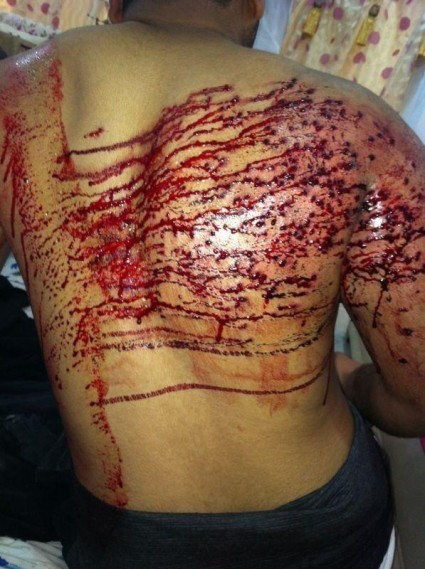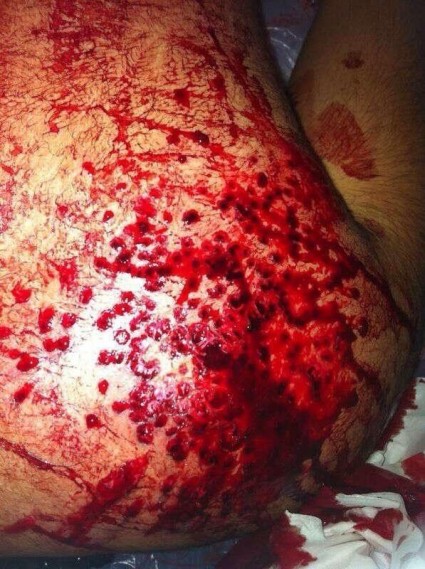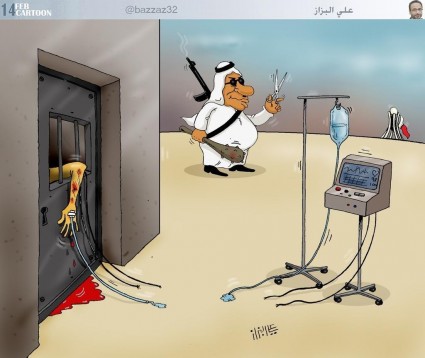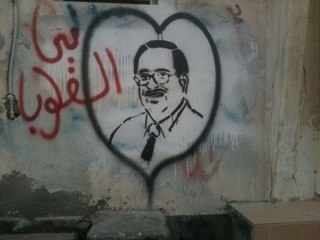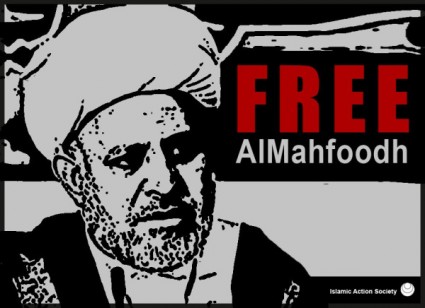Human Rights Groups Denounce Foreign Press Blockade in Bahrain
Bahrain: ANHRI Denounces Denying the American Journalist “Nicholas Kristof” Entry into Bahrain
30 December, 2012 – Arab Network for Human Rights Information
The Arabic Network for Human Rights (ANHRI), today, denounces the denying of the American journalist “Nicholas Kristof” entry into Bahrain.
New York Times journalist, Nicholas Kristof was also denied entry into Bahrain on December 17th, Kristof is an American citizen. He mentioned on his twitter account that “he is at Bahrain airport and the government is denying him entery”. He added that the airport officials acknowledged that US citizens are allowed to transit through Bahrain for 72 hours without a visa, but officials informed him that he is on a ‘blacklist’. He commented that “Bahrain which is our (ally) is terrified from human rights reporting”. Kristof visited Bahrain several times and met several activists, among them, the significant activist “Nabil Rajab” who is now in prison and the human rights activist “Zainb Alkhawaja”. He also wrote several significant reports related to Bahrain since the beginning of the revolution.
It worthy to be noted, that this is not the first time to deny entry of “Kristof”, as he was denied entry on the beginning of February after the authorities denied to enter Bahrain.
ANHRI said that “denying the journalists’ entry into the country, is not the only violation committed by the authorities against the press freedoms, as 2012 witnessed several violations against the journalists, which included physical assaults, murder and legal prosecution to number of them”.
ANHRI has called on the regime to respect the freedom of expression, the press freedoms and to stop harassing the journalists and media-professionals who support the Bahraini uprising. …source
December 31, 2012 Add Comments
Bahrain Regime attempts to “blind the eyes” that witness its evil deeds, Kidnaps Photojournalist
Bahrain: Award Winning Photographer Ahmed Humaidan Kidnapped and Detained
30 December, 2012 – Bahrain Center for Human Rights
The Bahrain Center for Human Rights condemns the continued harassment and arbitrary arrest of journalists in Bahrain. Renowned and award-winning photographer, Ahmed Humaidan, (25 years-old) was kidnapped by 15 security officers, in civilian clothing, and is currently being detained.
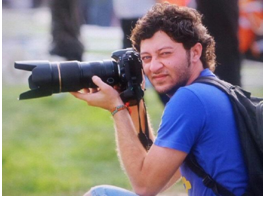
Ahmed Humaidan, (25 years-old) kidnapped by Security Forces
On the 29th of December, 2012, at approximately midnight and while Ahmed Humaidan and his friends were entering the city center shopping mall, 15 men in civilian clothing, who are believed to belong to the security forces, surrounded Humaidan and abducted him without declaring the location where they were going, nor identifying themselves. His family sought information about him in different police stations and the Criminal Investigation Department (CID) without receiving any information. After 19 hours without news on his whereabouts, Humaidan called his family for 20 seconds to inform them that he is alive, and that he is at the Criminal Investigation Department (CID) being interrogated without the presence of his lawyer.
Through his photos, Ahmed has documented many moments in the daily protests (See his instagram page for example: instagram.com/ahmedhumaidan and 500px.com/AhmedHumaidan)
Ahmed Humaidan is a member of the FIAP “Fédération Internationale de l’Art Photographique” and the PSA “Photographic Society of America”.
He won 143 international awards in photographic competitions and he is considered the 2nd highest ranked Arab photographer in winning photography contest, among his awards are:
– Gold Medal in FKNS Grand Prix 2012 – Serbia.
– Gold Medal from FIAP for Hungarian Circuit 2012.
– Honorary Badge from for PSA International Exhibition (Photojournalism Prints) – 2012
The Bahrain Center for Human Rights believes that the arbitrary arrest of Ahmed Humaidan is solely related to his legitimate work as a photographer and his activity in documenting protests and police attacks, which has led to exposing the severe human rights violations by the authorities in Bahrain. …more
December 31, 2012 Add Comments
Bribes and brutality attempt to keep regime crimes and abuse against citizens away fro Western audiences
Bribes from Al-e Khalifa Behind Media Silence over Bahrain Events
31 Decemebt, 2012 – ABNA
Secretary general of Al-Wifaq National-Islamic Society in Bahrain said the Al-e Khalifa regime’s policies have caused the silence of the media over what is going on in the country.
Bribes from Al-e Khalifa Behind Media Silence over Bahrain Events
(Ahlul Bayt News Agency) – Sheikh Ali Salman said the regime is maintaining a media monopoly and gives kickbacks to the mass media to remain silent about the country’s events, Swat Al-Manama website reported.
He added that the government-based media have failed to convince the nations about the developments in Bahrain.
Salman said the world public opinion recognizes that the people of Bahrain are demanding democracy but they regime denies them their basic rights by carrying out a crackdown with the help of foreign forces.
According to the secretary general of Al-Wifaq National-Islamic Society, the Bahraini regime tries to misrepresent the country’s revolution in different ways such as banning the activities of independent media.
He referred to the case of CNN reporter who had prepared a report about Bahrain and was banned from airing it, saying that the reporter revealed that Al-e Khalifa has bribes CNN to manipulate its reports about Bahrain.
Salman underlined that in the current era, which is the age of new mass media, the truth will spread and reveal lies. …source
December 31, 2012 Add Comments
Bahrain detains “Slapping Policeman” as video goes viral – daily beatings and birdshot attacks by police go unabated
Bahrain Detains Officer for Slapping Man
By ROBERT MACKEY – 28 Decemebr, 2012 – NYT
Although Bahrain has previously failed to prosecute members of its security forces caught on video shooting unarmed protesters, this week an officer who slapped a man with a baby in his arms was detained after video of the incident attracted wide attention.
The activist Ala’a Shehabi drew attention to the video, which was recorded on Sunday in the village of A’ali. …source
December 31, 2012 Add Comments
Smuggling, Corruption and Deception is endemic in Bahrain’s “Royal Family”
Eight falcons being taken to Bahrain seized
31 December, 2012 – Dawn.com
KARACHI, Dec 30: The customs officials have seized eight falcons of a Bahraini royal family member on suspicion that they have been changed during a visit here, Dawn has learnt.
A passenger was taking these falcons by a flight to Bahrain a few days ago, sources said.
Responding to Dawn queries on Sunday, customs assistant collector at the Jinnah International Airport Rana Aftab said that a few days ago a passenger, Salim Eid Rafeea Thani, brought 29 falcons and presented a document issued by the foreign ministry saying that the falcons belonged to a Bahraini royal family member, Sheikh Ahmed Ali Abdullah Isa Al-Khalifa, and he was taking the birds to Bahrain.
The customs official said that when the customs sleuths minutely checked the migratory falcons of the highly rare and endangered species, it was found that out of the 29 falcons eight had been changed, as they were different from those that had been brought in to the country by the Bahrain dignitary earlier.
When the passenger could not satisfy customs queries, the 29 falcons were seized. However, he said that 21 falcons seemed to be those that had been brought into the country earlier.
He said that on the passenger’s request the customs officials agreed to release the 21 birds, which were not disputed, provided that the passenger brought in new documents from the foreign ministry regarding the travelling of the 21 falcons.
A couple of days later, the passenger brought a new document from the foreign ministry saying that the falcons were owned by Bahraini royal family member Sheikh Ahmed Ali Abdullah Isa Al-Khalifa and that the passenger was carrying 21 falcons.
After scrutinising the documents and the re-examination of the 21 undisputed falcons, they were allowed to leave the country.
Now the passenger, Salim Eid Rafeea Thani, and a representative from the Bahrain consulate general had been told to come to the airport on Monday when the final decision regarding the eight seized falcons would be taken, added the customs official.
The sources said that Sheikh Ahmed bin Ali al-Khalifa, whose falcons had been seized, had been granted a special permit to hunt the internationally protected houbara bustards in Hyderabad district with Matiari.
This was the second time that a Bahraini dignitary was caught in the controversy relating to change of falcons — that they were trying to take back different falcons than the ones which they had brought in to Pakistan from Bahrain.
In the first instance, a Bahraini dignitary was trying to take out seven rare falcons that he had brought into the country just a day earlier, in November.
The falcons were seized and later confiscated by customs officials.
Saker and peregrine falcons are residents of colder central Asian regions and to avoid harsh weather conditions back home, they migrate southwards to the subcontinent to spend their winters in the comparatively warmer environment here.
Owing to their dwindling population, trapping and netting of, and trading in, of falcon species has been banned under the Sindh Wildlife Protection Ordinance.
Despite the ban during their brief stay here the birds are caught in large numbers and subsequently sold in black market to hunters. …source
December 31, 2012 Add Comments
Police convictions intended to dodge justice and regime accountiblity for torturer and murder of Abdul-Karim Fakhrawi
Judgments in Fakhrawi’s case of torture to death lack seriousness
31 December, 2012 – Al-Wefaq
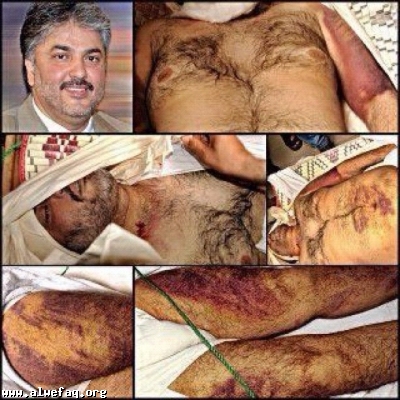
Al-Wefaq National Islamic Society stated that the Bahraini regime is mocking with cases of extrajudicial killings against citizens despite its acknowledgement of such cases after the Bassiouni report has confirmed them. The regime is circumventing and running away from prosecuting killers by changing the classification description of the crime from torture to beating leading to death, by this the regime is mocking with facts, al-Wefaq added
Al-Wefaq said the judgment to convict two intelligence services personnel and acquit two others, all accused of involvement in the killing of Bahraini business man and publisher, the martyr Abdul-Karim Fakhrawi, is a total irreverence to and cover for impunity policy.
Al-Wefaq further clarified, in its statement issued Sunday 30th December 2012, that the Bahraini regime does not want to build for prosecutions in torture cases against citizens and it attempts to change facts although the Bassiouni report has classified a number of cases, including Fakhrawi’s, as “deaths caused by torture”.
Al-Wefaq pointed out that there has not been a single judgment in Bahrain courts against torturers since the state was established in early 70s.
The statement said, “can torture practised during the state of emergency, and that had led to the death of four citizens in ten days, be considered a fight?”
Al-Wefaq considered the judgment based on non-serious measures of justice to victims, as the prosecution has considered the killing reckless acts of lower-ranked staff in order to exempt higher officials and let them continue to act with impunity. The Bahrain Independent Commission of Inquiry (BICI) report has confirmed torture in Bahrain as systematic and not individual cases, which means that higher officials in both the Ministry of Interior and the intelligence services (National Security) are responsible for torture and deaths caused by torture, and this is exactly why the Public Prosecution’s interrogations are insignificant and non-serious.
Al-Wefaq stated that the number of the accused and their posts proves that all the prosecution wants is to take on sham measures as part of its travesty of justice, by presenting lower officers claiming remedies for victims, however, the measures and questions of interrogations prove lack of seriousness to hold the killers and criminals accountable.
Al-Wefaq pointed out that the Public Prosecution and the court have clearly amended the case to fit protection for the accused. As the accusation has been amended to unintentional beating to death, which takes a 7 year sentence at most, while they were not accused of torture to death despite the circumstances of the case as the main purpose was to obtain coerced confessions from the martyr Fakhrawi.
Al-Wefaq expressed fears that the Appeals Court might acquit or reduce sentence of the criminals, or order to stop the implementation of the judgment after pressure is gone.
Al-Wefaq noted that the jail sentences against the accused have been issued without execution, unlike the judgment against human rights defender Nabeel Rajab, which has made him a hostage.
This brings us to compare the judgment to that of Kuwait’s which was issued a few days ago against officials who resorted to torture, as the Kuwaiti Minister of Interior has resigned following these unlawful acts, in order to prove seriousness in addressing torture, whereas the Bahraini judiciary’s handling of such issues prove that torture is a state policy to protect torturers.
Al-Wefaq stated that Sunday’s judgment (in Fakhrawi’s case) proves that the special unit of torture cases in the Public Prosecution and the Judiciary have failed to address human rights violations and claim remedies for victims. It further proves that any superficial solutions for this judiciary will fail, whether its special units or legislations, this judiciary needs a deep root reform, the statement said.
The statement concluded, al-Wefaq sees that the principle of accountability to human rights violators and punishment of criminals can only be achieved by benefiting from experiences of states that witnessed unlawful human rights violations in the absence of an impartial judiciary. Bahrain needs special courts established by international investigators to re-investigation and decide on issues related to violations. Al-Wefaq believes that the formation of a special court under international will and observation is the only way to track down human rights violators and hold them accountable. …source
December 31, 2012 Add Comments
US and its fascist friends in Saudia Arabia remain united in bid to snuff-out hopes of democracy in Bahrain
Bahrain brutal ally of US, Saudi Arabia: Activist
29 December, 2012 – PressTV
Saudi Arabia and the US are supporting the Al Khalifa regime to preserve their own interests, even if the cost is the lives and rights of the people of Bahrain, an activist says.
Bahrain is “home to the headquarters of the United States Navy’s Fifth Fleet, which patrols regional shipping lanes, assists with missions in Iraq and Afghanistan and monitors Iran as tensions in the region mount,” activist Zainab al-Khawaja said in a letter published by The New York Times.
The activist wrote, “The struggle for freedom and democracy in Bahrain seems hopeless” because of Bahrain’s allies, including Saudi Arabia and the United States.
“The United States speaks about supporting human rights and democracy, but while the Saudis send troops to aid the Khalifa government, America is sending arms,” she added.
Al-Khawaja criticized the United States for its “obvious double standard” approach toward the human rights situation in the Middle East.
“This double standard is costing America its credibility across the region; and the message being understood is that if you are an ally of America, then you can get away with abusing human rights,” she added.
She said that the US support of the Al Khalifa regime has given the Bahraini government the belief of having international immunity despite committing widespread human rights violations.
“This is why the most prominent Bahraini human-rights defenders are languishing in prison,” Al khawaja said.
In conclusion the activist proposed that the US halt its arms sales to Bahrain and that nongovernmental organizations, United Nations human rights investigators and journalists to be allowed to enter the country and investigate abuses.
Since a popular uprising began in Bahrain in mid-February 2011, scores have been killed, many of them under torture while in custody, and thousands more have been detained. …source
December 30, 2012 Add Comments
The al Saud regime makes Hitler’s Third Reich look like pacifists and the US and Germans are arming them to the teeth
Report: Saudis shopping for more German heavy weapons
30 December, 2012 – DW
Major German newspaper Bild has reported that Saudi Arabia is seeking 30 new German armored transport vehicles. The government’s weapons export policies have come under heavy media scrutiny of late.
The mass-circulation Bild am Sonntag newspaper reported on Sunday that the Saudi Arabian government wanted to purchase at least 30 heavily-armored infantry mobility vehicles from Germany.
Bild said, citing government sources, that the government in Riad was hoping to spend 100 million euros ($132 million) on 30 “ATF Dingo 2” vehicles. In the long term, the report said, the Islamist government could be in the market for up to 100 of the vehicles.
The paper said that the government’s council which meets in secret to discuss such matters had signaled its approval for the deal, which usually permits a producer to make the sale – adding, however, that it was not yet finalized. Although most international weapons sales are conducted by private manufacturers in Germany, almost all of them require approval from the federal government in Berlin.
A news magazine has provided new insight into the secret committee, chaired by Angela Merkel, that approves Germany’s weapons exports. Germany is selling more arms to the Middle East – especially Israel and Saudi Arabia. (04.12.2012)
The wholly-enclosed Dingo 2 can carry eight infantry personnel, and is equipped with a top-mounted machine gun as standard, operated from within by remote control. Other weaponry can be mounted on its roof. The Dingo 2 also boasts special sensors and other equipment designed to help seek, analyze and even withstand some traces of atomic, biological or chemical attacks.
The German government’s arms sales have come under intense media scrutiny of late. Weekly magazine Der Spiegel put a doctored image of Merkel in military uniform on its front page earlier in December, with the cover headline “German weapons for the world.”
That edition of the magazine was particularly critical of a proposed deal with Saudi Arabia to sell several hundred Boxer armored fighting vehicles. In August of 2011, Spiegel reported plans to sell 200 Leopard tanks to the Saudis, a story that prompted a Constitutional Court complaint from the opposition Greens.
The Social Democrat candidate for chancellor in next year’s federal elections, Peer Steinbrück, said in a newspaper interview last week that it was “a scandal and extremely dangerous that Germany has become the world’s third largest exporter of weapons.”
Critics of the German arms sales say that the weaponry might be used to suppress civilian protesters in the event of civil unrest comparable to regional neighbors. At the height of the 2011 unrest in tiny, neighboring Bahrain, Saudi security forces were deployed.
Saudi Arabia’s Sunni government is frequently criticized by rights groups and democracy advocates. Authorities said on Friday that a Shi’ite man, described as a rioter, was shot dead by security forces. …source
December 30, 2012 Add Comments
“know the human rights situation of any country, ask where their human rights defenders are”, Interview with Maryam Al-Khawaja
Behind the Bahraini Revolution: An Interview with Maryam Al-Khawaja
30 DEcemebr, 2012 – Shia Post
[The following is an interview conducted with Maryam Al-Khawaja, the acting president of theBahrain Center for Human Rights and the deputy director of the Gulf Center for Human Rights. She is currently in self-imposed exile in Denmark due to safety and security reasons, but remains closely connected to events on the ground in Bahrain. She posts regular updates on her Twitter, @MARYAMALKHAWAJA.]
Samia Errazzouki (SE): Can you give us a general overview of the current situation in Bahrain?
Maryam Al-Khawaja (MA): Whenever you want to know the human rights situation of any country, ask where their human rights defenders are. In Bahrain, all of the most prominent human rights defenders sit in prison cells today. The human rights situation has been deteriorating continuously since the beginning of the Bahraini Revolution on 14 February 2011. There are currently up to one hundred extrajudicial killings, and approximately one thousand eight hundred political prisoners, a significant amount of which are children under eighteen. At the Bahrain Center for Human Rights (BCHR), we continue to document cases of excessive force against protesters, arbitrary arrests, lethal use of tear gas, kidnappings, and systematic torture (physical, psychological, and sexual). The protests have continued on a daily basis since 14 February 2011.
One of the main problems for why the country has not moved forward in regard to stopping human rights violations is the culture of impunity that exists within the country, in addition to the existence of international immunity for Bahrain. The culture of impunity enforced by the regime and the king is the reason why nothing has changed. As Bahraini activists, we were hoping that the regime would take the Bahrain Independent Commission of Inquiry (BICI) as an opportunity to take a step in the right direction and implement real reforms. Instead, the regime used this five hundred-page report as a tool to buy itself time while it continues to commit the same violations. In some cases, the violations got worse. Additionally, during this period, Western countries continued to sell arms to the Bahraini government and business continued as usual. The people who were responsible for the massive widespread human rights violations in high positions were kept in their position or even promoted.
SE: What is the background for the political and civil rights movement in Bahrain?
MA: The 1990s Intifada was only one of many uprisings in Bahrain. To understand what led to the 1990s Intifada and the current revolution of 14 February 2011, one must understand the history of uprisings in Bahrain and the role of the civil rights movement. Since the 1920s, Bahrain has witnessed some sort of uprising almost every ten years. For example, in the 1950s, Intifadat al-Haya’a, which was led by the religious leaders of both the Sunni and Shia communities, started. At the time, Bahrain was still a British protectorate, so with the help of the British, the regime arrested all of the leading figures of that movement. The Sunnis among them were sent to Saint Helena Island and those who were Shia were exiled to Iran and Iraq.
In 1971, the British withdrew from Bahrain and one of the only good things they did for Bahrain was leave a constitution that gave people a real parliament. The constitution was passed in 1973. The parliament was elected, but in 1975, when Emir Isa tried to pass a decision to enforce a state of emergency, the parliament refused. In response, he dissolved the parliament. When people took to the streets in the 1990s, they were demanding a return to the 1973 constitution. There was systematic torture, arbitrary arrests, and people were killed. The general perception was that Isa’s brother, Khalifa bin Salman al-Khalifa, who was appointed prime minister in 1971, was the person actually ruling the country. During the 1990s, there was an uprising demanding a return to the 1973 constitution and an elected parliament. People were arbitrarily arrested, a number died under torture, and the crackdown continued for years. The main person known for setting up the systematic torture in Bahrain was Ian Henderson, who was nicknamed the “Butcher of Bahrain.” …more
December 30, 2012 Add Comments
Bahrain regime throws Western critics a bone, jails two policemen over detainee’s torture, death – abuse runs rampant
Police beatings in the streets away from station monitors rampant among US-UK Trained Police force
Bahrain policemen jailed over detainee’s torture, death
30 December, 2012 – Agence France Presse
DUBAI: A Bahrain court on Sunday jailed two policemen for seven years each after convicting them of torturing to death a Shiite detainee in the wake of last year’s crackdown on protests, a local daily said.
The Gulf kingdom’s high criminal court found the two national security members guilty of torturing Abdul Karim Fakhrawi to death while in detention, Al-Wasat’s online edition reported.
The court had in May thrown out the case against the two defendants for lack of proof and sent it back to the prosecution for further investigation.
A number of policemen are being investigated or are on trial for allegedly torturing detainees after hundreds of Shiites were rounded up when security forces in the Sunni-ruled state quelled a month-long protest in mid-March 2011.
Authorities say they are implementing the recommendations of an independent commission of inquiry called for by the king that confirmed allegations of excessive use of force by security forces during the uprising.
Home to the US Fifth Fleet and strategically situated across the Gulf from Iran, Bahrain still sees sporadic Shiite-led demonstrations, mostly outside the capital Manama.
According to the International Federation for Human Rights, around 80 people have been killed in Bahrain since the violence first broke out on February 14, 2011. …source
December 30, 2012 Add Comments
EU Human Rights Delegation’s calls for release of Political Prisoners in Bahrain callously ignored by regime
Bahrain regime urged to free prisoners
21 December, 2012 – PressTV
The head of a European Parliament human rights delegation has called on the Bahraini regime to free political prisoners.
During a Thursday visit to the Bahraini capital Manama, Inese Vaidere called on Bahraini officials to release all “prisoners of conscience” to soothe political tensions in the country.
Vaidere further said the European delegation paid a visit to imprisoned opposition leaders, including Abdulhadi al-Khawaja, who has been sentenced to life in prison.
The European team’s visit to Bahrain comes nearly a week after the Bahraini prince called for dialogue with the opposition on December 5, saying only talks could solve the political unrest in Bahrain.
The uprising in Bahrain began in mid-February 2011.
The Manama regime promptly launched a brutal crackdown on peaceful protests and called in Saudi-led Arab forces from neighboring states.
Dozens of people have lost their lives in the crackdown, and the security forces have arrested hundreds, including rights activists, doctors and nurses.
Bahraini demonstrators say they will continue holding anti-regime protests until their demand for the establishment of a democratically elected government is met. …source
December 30, 2012 Add Comments
Karim Fakhrawi Founder of Al-wasat tortured to death by Regime just over 18 months ago
Karim Fakhrawi Founder of Al-wasat tortured to death by Regime just over 18 months ago
12 April, 2011 – CPJ
Fakhrawi, founder and board member of Al-Wasat, the country’s premier independent daily, died in state custody a week after he was detained, according to news reports. Human rights defenders told CPJ that Fakhrawi had gone to a police station on April 5 to complain that authorities were about to bulldoze his house.
Bahrain’s official news agency said on Twitter that Fakhrawi died of kidney failure. Photographs published online, however, showed a body identified as that of Fakhrawi with extensive cuts and bruises.
The journalist’s arrest came amid sweeping civil unrest in Bahrain and a government crackdown on independent reporting. In early April, the government accused Al-Wasat of “deliberate news fabrication and falsification,” said it would file criminal charges against three of the paper’s senior editors, and deported two of its senior staffers.
Fakhrawi was one of numerous investors in Al-Wasat, local journalists told CPJ. He was also a book publisher, the owner of one of Bahrain’s biggest bookstores, and a member of Al-Wefaq, Bahrain’s chief opposition party.
Fakhrawi’s death was the second media fatality in Bahrain in less than a week, both occurring in government detention facilities. In the two decades prior to that, no journalists had died in relation to their work in Bahrain, CPJ research shows. …source
December 30, 2012 Add Comments
Stalemate in Bahrain? …don’t believe it. Amanpour Interview with Maryam Alkhawaja
It seems CNN is trying to redeem its abuse of Amber Lyon, after her reporting and termination over Bahrain, by allowing Amanpour to do some o’penitence reporting’ on Bahrain. The stories title “Stalemate in Bahrain” is curious. The al Khalifa regime has lost all credibility as a government with the vast majority of the people and it slides closer to its demise everyday. The state of Bahrain today is nothing short of a Military Junta led by the King and his family. The remaining opposition leaders, that are not currently in prison and who only months ago, would have worked out an opportunistic power sharing arrangement with the regime, have become fragmented and unsorted regarding reform making reform a practical impossibility.
This is not a Stalemate. The regime now must cede power in a genuine effort toward democracy or the ‘slow bleed’ unto death will continue until the Kingdom falls. At this point all that remains is a countdown to the Kingdom’s doom. The longer the US gives the regime a pass on its abuse and the regime fails to cede power unto democracy, the further Bahrain’s future leaders will move away from any working partnership with the US. Maryam al-Khawaja has hit the nail squarely on the head, it is not a matter if, but when democracy triumph in Bahrain. Phlipn out.
See Amapour blog “Stalemate in Bahrain” headline HERE
December 29, 2012 Add Comments
The Streets are Hot with resistance demanding Hamad’s Exodus
December 28, 2012 Add Comments
Karbabad Marches agasint Hamad
December 28, 2012 Add Comments
Karranah Marches against Hamad
December 28, 2012 Add Comments
Crack down in Asaadada
December 28, 2012 Add Comments
Birdshot in Bahrain: The legacy UK-US Policing Consultants John Yates, John Timoney
December 27, 2012 Add Comments
After nearly two years of brutal crackdown and human rights abuses Obama continues support for doomed Bahrain regime
December 27, 2012 Add Comments
Wonder who those “hooded supervisors” are when Bahrain Police are cracking heads, gassing neighborhoods?
Saudi special military unit assists Bahrain crackdown on protesters
26 December, 2012 – PressTV
Press TV has learned that the specially trained military unit, named Fahud Nayef bin Abdul Aziz, has been operating in Bahrain to help the kingdom’s forces silence ongoing demonstrations against the decades-long rule of the Al Khalifa royal family.
The unit is reportedly under the control of Saudi Arabia’s Interior Ministry and was founded when Nayef was serving as the kingdom’s interior minister.
The Saudi forces were deployed to Bahrain in mid-March 2011, to help the Manama regime launch brutal crackdowns on peaceful protests. Saudi forces have also reportedly used Bahraini police uniforms when cracking down on protesters.
The Fahud unit is also regarded as a full army, which is in charge of torturing prisoners in tens of detention centers across the country.
It is now controlled by Nayef’s son, Mohammad bin Nayef Abdul Aziz, who was appointed as the country’s Interior Minister last month.
The Fahud unit was has been used by Saudi Arabia to crack down on protesters due to its notorious reputation in the region.
The unit is also involved in the arrest, murder and suppression of people in the Qatif region of Saudi Arabia’s oil-rich Eastern Province, which has been rocked by anti-regime protests since last year.
The uprising in Bahrain began in mid-February 2011. Dozens of people have lost their lives in the crackdown, and the security forces have arrested hundreds, including rights activists, doctors and nurses.
Saudi Arabia has been also facing a rise in protests against arbitrary detentions and widespread demands for the release of political prisoners.
According to the Saudi Civil and Political Rights Association, there are about 30,000 political prisoners in the kingdom.
Saudi Arabia has also been rocked by anti-regime protests since February 2011 with demonstrators holding numerous protests in different parts of the country, mainly in the oil-rich Eastern Province. …source
December 26, 2012 Add Comments
Obama’s brutal ‘friends’ in Bahrain – the al-Khalifa’s lost credibility ensures their demise
Zainab al-Khawaja, an activist, was arrested and jailed earlier this month and charged with inciting hatred against the Bahraini government.
Bahrain, a Brutal Ally
By ZAINAB al-KHAWAJA – 25 December, 2012 – NYT OpEd
EARLIER this month, Aqeel Abdul Mohsen, 19, was shot in the face for protesting against Bahrain’s government. He was covered in blood, with the lower side of his face blown open, his jaw shattered, and a broken hand hanging awkwardly from his wrist. It’s one of those images that you wish you had never seen, and can never forget.
After more than 10 hours of surgery, and before Mr. Abdul Mohsen regained consciousness, his hospital room was already under guard by the police. Had he been able to speak, he might even have been interrogated before going into surgery. Others have lain bleeding without medical attention while government security agents asked questions like: “Were you participating in a protest? Who else was with you?”
Bahrain, a small island nation off the coast of Saudi Arabia, has been ruled by the Khalifa family for more than 200 years. It is also home to the headquarters of the United States Navy’s Fifth Fleet, which patrols regional shipping lanes, assists with missions in Iraq and Afghanistan and monitors Iran as tensions in the region mount.
The oppressed people of Bahrain joined the Arab Spring soon after the fall of President Hosni Mubarak in Egypt. With newfound hope, Bahrainis took to the streets on Feb. 14, 2011. Rich and poor, Shiite and Sunni, liberal and religious, they felt what it was like to speak freely for the first time in the capital, Manama, at a traffic circle with a pearl monument at its center. The Pearl Roundabout came to symbolize the Bahraini revolution.
But this newfound freedom didn’t last long. The government’s security forces attacked the peaceful protesters, then tore down the Pearl monument. And in March 2011, troops from neighboring Saudi Arabia and the United Arab Emirates intervened to suppress our pro-democracy protests.
Going out on the streets, carrying nothing but a flag and calling for democracy could cost you your life here. Chanting “down with the dictator” could lead to your being subjected to electric shocks. Giving a speech about human rights and democracy can lead to life imprisonment. Infants have died after suffocating from toxic gases used by riot police. And teenage protesters have been shot and killed.
It’s not unusual in Bahrain to find families with four or five members in prison at the same time. My father, Abdulhadi al-Khawaja, was beaten unconscious in my apartment in front of my family, as a report last year by the Bahrain Independent Commission of Inquiry documented. He was then taken away with my husband and brother-in-law; they were all tortured.
My husband was released in January, and my brother-in-law was released after a six-month sentence in late 2011; my father was sentenced to life in prison. He staged four hunger strikes; the longest lasted 110 days and almost cost him his life. (He was force-fed at a military hospital.)
But despite all these sacrifices, the struggle for freedom and democracy in Bahrain seems hopeless because Bahrain’s rulers have powerful allies, including Saudi Arabia and the United States.
For Bahrainis, there doesn’t seem to be much of a difference between the Saudis and the Americans. Both are supporting the Khalifa regime to preserve their own interests, even if the cost is the lives and rights of the people of Bahrain.
The United States speaks about supporting human rights and democracy, but while the Saudis send troops to aid the Khalifa government, America is sending arms. The United States is doing itself a huge disservice by displaying such an obvious double standard toward human rights violations in the Middle East. Washington condemns the violence of the Syrian government but turns a blind eye to blatant human rights abuses committed by its ally Bahrain.
This double standard is costing America its credibility across the region; and the message being understood is that if you are an ally of America, then you can get away with abusing human rights.
If the United States is serious about protecting human rights in the Arab world, it should halt all arms sales to Bahrain, bring Bahrain’s abuses to the attention of the United Nations Security Council, support a special session on Bahrain at the United Nations Human Rights Council, and begin a conversation about potential diplomatic and economic sanctions. The Obama administration should also demand that high-level Bahraini officials be held accountable for human rights abuses, and that nongovernmental organizations, United Nations human rights investigators and journalists be allowed to enter the country and investigate abuses.
At present, the Bahraini government believes it has international immunity. It commits widespread human rights violations, and business continues as usual: the government continues to buy arms and negotiate lucrative deals, without having to face any real consequences. This is why the most prominent Bahraini human-rights defenders are languishing in prison. Until the United States starts to put real pressure on its ally, Bahrain’s government has no incentive to change.
No matter the price, Bahrainis will keep demanding the very values — human rights and democracy — that the United States claims to stand for. It is an outrage that America continues to back a regime that tramples them. …source
December 26, 2012 Add Comments
Bahrain Regime uses Prisons as Death Chamber for Sick and Injured Prisoners
December 26, 2012 Add Comments
Free Ebrahim Sharif
December 26, 2012 Add Comments
Free Sheikh Mohammed Ali al-Mahfoodh
December 26, 2012 Add Comments
Amal Society leader, Sheikh Mohammed Ali al-Mahfoodh, to remain imprisoned for Freedom of Expression
Bahrain: Court Sentences Opposition Leaders of Amal Society on Charges Related to Freedom of Expression
8 December, 2012 – Bahrain Center for Human Rights
The Bahrain Center for Human Rights expresses its concern over the continued exploitation of civilian courts in the suppression of free speech, and particularly against political opposition leaders, which was most recently seen in the verdict against the leaders of the Islamic Action Society.
On the 28th of November, 2012, the higher court of appeal reduced the sentence of the General Secretary of the Islamic Action Society (Amal) Sheikh Mohammed Ali al-Mahfoodh, to 5 years in prison, one year after a military court sentenced him to 10 years imprisonment on the 4th of October, 2011. An additional three members of the same society had their military sentences reduced from 10 to 5 years in prison, five members had their sentences reduced from 5 years to either 1 year, 6 months, or 1 month, and these five individuals were therefore released for having completed their sentences. In addition, Shaikh AbdulAdheem AlMuhtadi, who was accused in the same case and sentenced to 5 years imprisonment by the military court, has been acquitted after spending nearly 2 years in prison.
The charges against these opposition leaders included: “Promoting the overthrow of the government by force and illegal means, and resort to marches and rally the crowds to resist the authorities, and incitement to refrain from work.”
These charges are solely based on the coerced confessions of the defendants, which were made during a time when the authorities used torture as a means to extract false confessions. This has been well documented in the Bahraini Independent Commission of Inquiry report (BICI).
The daughter of Amal General Secretary, Al-Mahfoodh says that while in detention, her father was tortured, electrocuted, and whipped so badly she could barely recognize him when she saw him for first time several weeks after his arrest.
Throughout the appeal trial sessions, the defendants repeatedly informed the court of the torture they were subject to. The defendants stated that they were tortured by Bahraini and Jordanian officers, and that there were nurses and doctors who were responsible for checking the pulse of the tortured defendant to advise the officers on whether they could continue the torture when the victim collapsed. Witnesses have informed the court of the beating of the defendants at time of their arrest. Although the court formed a medical committee to examine the defendants, the court has avoided conducting a full investigation into these allegations of torture.
Hisham AlSabagh, a representative of the Amal Society has stated that there are approximately 200 individuals who are involved with the society currently detained in prison. The opposition society, which was licensed since 2005, was unjustly dissolved by a court ruling in July 2012.
While the BCHR welcomes the acquittal of one defendant in the case, the BCHR stresses the fact that all the defendants should be acquitted and released immediately as their charges are directly related to the exercise of their freedom of expression and freedom of assembly. The prosecution has failed to provide any evidence of the use of violence by the opposition leaders in this case.
Several more opposition leaders are serving long-term prison sentences, including the General Secretary of the National Democratic Work Society, Ebrahim Sherif, who was sentenced to 5 years by a military court last year, and whose appeal was rejected in September 2012.
Based on the above, the Bahrain Center for Human Rights calls for the following:
• Release all the prisoners of conscience where the ruling was made in a court that lacks transparency and independence, and particularly the opposition leaders who were targeted for the practice of the freedom of expression and freedom of assembly in accordance with the universal declaration of human rights.
• Comply with the recommendations made in the Bahrain Independent Commission of Inquiry report, and especially the recommendations that indicate the necessity of investigating torture allegations and prosecuting those responsible for it, especially in the National Security Apparatus.
• Hold accountable all those involved in the National (Military) Safety Courts for the human rights violations committed against the defendants.
…source
December 26, 2012 Add Comments

